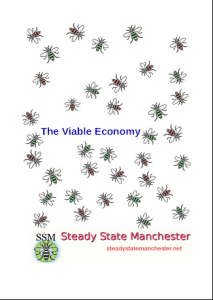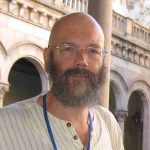62
Mark Burton, Steady State Manchester, UK
Introduction
There is widespread recognition that we (people and planet) are in a dreadful mess, economically, socially and ecologically. These interlinked crises affect us all in various ways, whether in urban or rural settings, in rich countries like the UK or at the other end of our supply chains and of our global pollution, and they are also a major risk for those yet to be born. Yet despite many good analyses of the problem, exciting local initiatives and good policy proposals, there is still a lack of a convincing narrative and strategy that links all this together in a way that can help crystallise the kind of coalition for economic, social and ecological justice we so badly need.
The Manchester collective, “Steady State Manchester” has been working for the last three years on the idea of a post-growth economy. This proceeds from the understanding that aggregate growth of the economy is deeply problematic, ecologically, socially and indeed, in its own terms, economically (e.g. O’Neil, Deitz and Jones, 2010). We have focussed on its implications at the municipal and regional levels, emphasising re-localisation (in the context of “globalisation gone mad”), redistribution and equality, the money-debt-credit-investment system, and how to assess the well-being of the community without reliance on the crude economistic measures of GDP and GVA growth.
As well as exploring and articulating what a post-growth economy and society would mean in a municipal and regional context (our distinctive focus), our project aims to build support for its proposals. We aim to make this approach, which aligns ecological, social and economic well-being, a part of everyday understanding – a new common sense in our region.
Our context is challenging because our municipal and regional leaders subscribe to the economic growth orthodoxy, linked to a version of ‘trickle-down theory, whereby it is argued that growing the economy, largely by attracting external capital investment via prestige projects, will increase incomes and bring social benefit for all, including the disadvantaged sections of the community.
This view is linked to the model of competition in a global economy, to promotion of the city (“civic boosterism” or more recently “aglommeration boosterism”, Haughton, Deas, & Hincks, 2014). To the extent that it pays attention to ecological problems it does so via what has been termed “ecological modernisation”, where the primary argument becomes that of building a green economy in order to further create growth (Asafu-Adjaye, 2015; Deloitte, 2008): again, it is an economic rationality that dominates (Burton, 2013). Despite this there is an undercurrent of dissatisfaction, since people know that the model is flawed, that it does not deliver genuine prosperity, but instead increases inequality and has a high ecological cost.
As a small collective of five people, we have to work via other organisations, groups and people to have the maximum effect (leverage). That involves appealing to people’s values (e.g. for social justice), colonising dominant discourse (e.g. an emerging discourse about good vs. bad growth (Henderson & Capra, 2009) while taking care that the message is not diluted or co-opted (Steady State Manchester, 2013). We are building up a core of people who can articulate Steady State and Degrowth thinking, and working closely with influential groups and organisations. Through our series of reports, commentaries, blog posts, meetings, workshops and discussions we use research evidence to establish the validity of the approach, while recognising that ultimately this is not a battle that will be won by having ‘the best ideas and facts’. Drawing on community psychology (Kagan, Burton, Duckett, Lawthom & Siddiquee, 2011) and other praxis, we create temporary settings to explore ideas, maximising the ‘edge’ (Kagan, 2007) between disparate sectors to generate new thinking and cooperation. We are thereby trying to build support for a counter-hegemonic model across sectors. In so doing we have an influence beyond our small size, beginning to frame disparate understandings within a shared alternative framework (our Viable Economy).
We have had some successes, being taken seriously by local green groups, anti-poverty campaigners, as well as some academics, policy professionals and local politicians with whom we are in dialogue. Some of our proposals have been adopted despite official rejection of our core message that continued growth of the economy is neither possible nor desirable.
Problems we face
Whatever our modest successes, we face an uphill struggle. Policy, politics and discourse are ‘locked in’ to the orthodox model, meaning that arguing for an alternative can still be met with incomprehension and horror. We are a small group fighting a hegemonic ideology that is broadly consistent across much of the political spectrum, fusing neoliberal economic rationalism with ecological ignorance in a highly plausible way, supported by the phantom abundance of global capitalism, the erosion of culture and the manufacture of insecure identity. So ideas get de-contextualised, distorted and then used to legitimate orthodox policy. This infects even supposedly, or once counter-hegemonic political movements. So in the the North, political parties (such as the UK Labour Party, the French Parti Socialiste, the Spanish PSOE, or Greek PASOK), whose original mission concerned economic justice, have mostly end up offering ‘austerity lite’ and the use of market mechanisms for pressing tasks like climate change mitigation (Lohmann, 2009). Meanwhile, in the South, reforming parties are wedded to an economic and social strategy based on extractivism (Gudynas, 2011, 2012): a form of dependence within the global accumulation regime.
Nevertheless, we live in times of crisis, when, to paraphrase Gramsci, the old order is dying but the alternative is struggling to emerge. Activist scholars need to work with the opportunities and threats inherent in that context.
Conclusion
Our work assumes that, despite globalisation, it is possible to intervene in local economies at municipal and regional levels, promoting a practical vision of economic, social and ecological viability, what we call the Viable Economy (Burton, 2014; Steady State Manchester, 2014). However, while it is possible to build alliances and influence thinking and practice, the dominant system is designed to resist these challenges in multiple ways, so it is essential that the relevant movements join together, learning from and supporting each other in the struggle for a better world, and for human survival itself.
References
Asafu-Adjaye, J., & 17 others. (2015). An Ecomodernist Manifesto. ecomodernism.org. Retrieved from http://www.ecomodernism.org/manifesto/
Burton, M. (2013). In and against social policy. Global Journal of Community Psychology Practice, 4(2). Retrieved from http://www.gjcpp.org/pdfs/burton-v4i2-20130522.pdf
Burton, M. (2014). Equity, sustainability and the ‘viable economy’. Manchester, On the Platform Website. http://ontheplatform.org.uk/article/equity-sustainability-and-viable-economy
Deloitte. (2008). “Mini-Stern” for Manchester: Assessing the economic impact of EU and UK climate change legislation on the North West and Manchester City Region. London: Deloitte. Retrieved from http://www.climatechangenorthwest.co.uk/resources/greater-manchester-mini-stern-2008
Gudynas, E. (2011). Debates sobre el desarrollo y sus alternativas en América Latina: Una breve guía heterodoxa. In M. Lang & D. Mokrani (Eds.), Más allá del desarrollo. Quito: Fundación Rosa Luxemburgo y Abya Yala.
Gudynas, E. (2012). Estado compensador y nuevos extractivismos Las ambivalencias del progresismo sudamericano. Nueva Sociedad, (237), 128–146.
Haughton, G., Deas, I., & Hincks, S. (2014). Making an impact: when agglomeration boosterism meets antiplanning rhetoric. Environment and Planning A, 46(2), 265–270. doi:10.1068/a130335c
Henderson, H., & Capra, F. (2009). Qualitative Growth. London: Institute of Chartered Accountants in England & Wales.
Kagan, C. (2007). Working at the “Edge”: Making use of psychological resources through collaboration. The Psychologist, 20(4), 224–227.
Kagan, C., Burton, M., Duckett, P., Lawthom, R., & Siddiquee, A. (2011). Critical Community Psychology. Chichester: Wiley.
Lohmann, L. (2009). When markets are poison: learning about climate policy from the financial crisis. (Briefing No. 40) (p. 68). London: The Corner House. Retrieved from http://www.thecornerhouse.org.uk/resource/when-markets-are-poison
O’Neill, D. W., Dietz, R., & Jones, N. (Eds.). (2010). Enough is Enough: Ideas for a Sustainable Economy in a World of Finite Resources. The report of the Steady State Economy Conference. Leeds: Center for the Advancement of the Steady State Economy and Economic Justice for All. http://steadystate.org/wp-content/uploads/EnoughIsEnough_FullReport.pdf
Steady State Manchester. (2013). Good and bad growth? Retrieved from http://steadystatemanchester.net/2013/09/29/good-and-bad-growth/
Steady State Manchester (2014) The Viable Economy. Manchester: Steady State Manchester. https://steadystatemanchester.files.wordpress.com/2014/11/the-viable-economy-master-document-v4-final.pdf
Author Biography
 Mark Burton is an independent scholar activist with a background in public service management. His interests cover alternative approaches to social science (primarily economics and psychology) and ethics, informed by thinking from political ecology and subaltern social movements, especially those in Latin America. He lives in Manchester and is one member of the Steady State Manchester collective. He is visiting professor at the Research Institute for Health and Social Change at Manchester Metropolitan University.
Mark Burton is an independent scholar activist with a background in public service management. His interests cover alternative approaches to social science (primarily economics and psychology) and ethics, informed by thinking from political ecology and subaltern social movements, especially those in Latin America. He lives in Manchester and is one member of the Steady State Manchester collective. He is visiting professor at the Research Institute for Health and Social Change at Manchester Metropolitan University.
Contact Details:
Email: mark.burton@poptel.org
Twitter: @MarkHBurton and @SteadyStateMcr
Web: htpp://steadystatemanchester.net and http://mmu.academia.edu/MarkBurton

